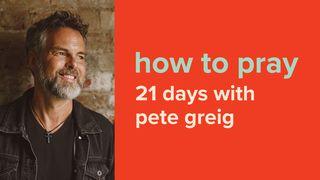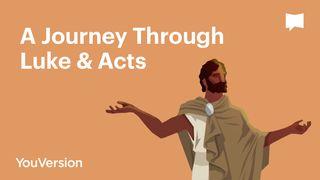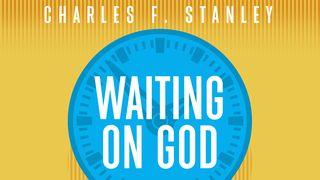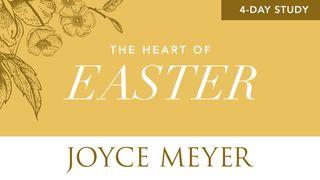The Bible with Nicky and Pippa Gumbel, Classic Version, 2020Sample

How to Enjoy a Lifetime of Favour
When I was at university I was taken to a talk entitled, ‘Where will you be in ten years’ time?’ It was intended to be an encouragement to us to persevere in our faith in spite of all the challenges that life would hold after university. All that I can remember is thinking at the time, ‘Ten years! That is a lifetime away.’ I could not even begin to imagine that far ahead.
Now, by contrast, I look back at my life and ten years ago seems like yesterday. Life has flown past. It seems to be accelerating at an alarming rate. I now understand the wisdom of those who encouraged us early on to take the long view.
We live in a society of instant gratification. Instant meals. Instant messaging. Instant cash. Instant loans. Instant fake tans. Instant fortunes won. There is a great danger of short-termism. The passages for today remind us that God is the ‘everlasting God’ (Isaiah 40:28). God views things through a wide-angled lens: He takes a long view and He wants you to enjoy a lifetime of His favour (Psalm 30:5).
Psalm 30:1-7
The long view of life
Are you going through a difficult time? Do you wonder whether it will last forever?
God’s ‘favour lasts a lifetime’ (v.5). As David looked back on his life, he was filled with thankfulness and ‘praise’ (v.4). Yes, he had been through some very difficult times. But God ‘lifted [him] out of the depths and did not let [his] enemies gloat over [him]’ (v.1). When he called to God for help, God ‘healed’ him (v.2).
‘God, my God, I yelled for help
and you put me together.
God, you pulled me out of the grave,
gave me another chance at life
when I was down-and-out’ (vv.2–3, MSG).
David had times when God was angry with him (v.5) and where God hid His face from him (v.7b). (After all, David did commit adultery and murder.) Yet, as he looked back on his life he was able to see that the moments of trial and testing were in the context of a lifetime of God’s favour.
Father, thank You that Your anger lasts only a moment but Your favour lasts a lifetime. Thank You that You are the same yesterday, today and forever and I can trust You.
Mark 12:13-27
The long view of eternity
What happens to people when they die? Is death really the end? You may have lost a family member or close friend and you wonder whether you will ever see them again. Where are they now? Are they gone forever? Are they just asleep? Or are they, in some way, alive?
Jesus’ opponents were constantly trying to catch Him out with their questions (v.13).
First, they tried to trap Him over money. However, even they recognized that Jesus was ‘a man of integrity’. They knew that Jesus spoke the truth whether or not it was popular (v.14). Jesus avoided the trap and gave an amazing answer (vv.15–17). (See BiOY Day 34.)
Next, they asked Jesus a hypothetical question to test Him. This one was about life after death. There was an internal debate in Judaism between the Pharisees and the Sadducees about whether or not there was life after death. [The way I remember the distinction is that it was the Pharisees (‘far I see’) who did believe in the resurrection, whereas the Sadducees (‘sad you see’) did not.]
Jesus pointed out that the Sadducees were wrong for two reasons: First, they did ‘not know the Scriptures’, and second, they did not know ‘the power of God’ (v.24).
The Scriptures
Jesus affirms the absolute certainty of the resurrection of the dead. Since the Sadducees only really believed in the authority of the Pentateuch (the first five books of the Bible) Jesus bases His argument on them and quotes from Exodus 3:6: ‘Now about the dead rising – have you not read in the book of Moses, in the account of the burning bush, how God said to him, “I am the God of Abraham, the God of Isaac, and the God of Jacob”? He is not the God of the dead, but of the living’ (Mark 12:26–27). In other words, Abraham, Isaac and Jacob are still living now!
2.
The Power of God
In 1 Corinthians 15, there is the most sustained and in-depth argument of the New Testament on the subject of the resurrection of the dead. Paul emphasizes again and again the power of God, which the Sadducees denied. He writes that the body is sown ‘in weakness’, yet it is raised as a resurrection body after death, ‘in power’ (1 Corinthians 15:43). God ‘gives us the victory through our Lord Jesus Christ’ (vv.56–57).
The wonderful truth is that the same power that was at work in raising Christ from the dead is at work in you now, bringing you more into the likeness of Christ (see Ephesians 1:19–20), and also in the future, in bringing your body to be a resurrection body in the new creation.
Therefore, everyone who has died in Christ is still living now. You will see them again. Even though the separation is so hard, all the struggles of this life have to be seen in terms of eternity. God takes the long view.
Thank You so much, Lord, that this life is not the end. Thank You that the dead will rise. Help me to see all the struggles of this life in the light of eternity.
Leviticus 11:1-12:8
The long view of history
What on earth is the point of all these regulations in Leviticus? Why are they in the Bible?
As always, we understand the Old Testament in the light of the New Testament and, in particular, through the lens of Jesus. God had a long-term plan. He was preparing the world for the coming of Christ.
The New Testament tells us that all these seemingly strange regulations that we read about in today’s passage are only ‘a shadow of the things that were to come; the reality, however, is found in Christ’ (Colossians 2:17). The purpose of the regulations was to teach about holiness – ‘I am the Lord your God; consecrate yourselves and be holy, because I am holy’ (Leviticus 11:44).
Peter quotes this verse in his first letter when encouraging holy living amongst the early Christians. He writes, ‘As obedient children, do not conform to the evil desires you had when you lived in ignorance. But just as he who called you is holy, so be holy in all you do; for it is written: “Be holy, because I am holy”’ (1 Peter 1:14–16).
Yet the New Testament also tells us that God has now made us holy through Christ. Therefore, the apostle Paul also says, ‘Do not let anyone judge you by what you eat or drink’ (Colossians 2:16). All these regulations have now been superseded through the coming of Jesus.
Many of the regulations were probably there for very practical reasons. For example, the eating of pigs (as carriers of disease) may well have been banned chiefly as a danger to health. Similarly, the rules of decontamination, strict as they are, take account of practical necessities. God wants you to eat wisely and healthily!
Purification after childbirth was not about moral uncleanness but ceremonial uncleanness (Leviticus 12:2). The cleansing was from the ‘flow of blood’ (v.7), not from any guilt attached to marital intercourse or childbirth. These regulations may actually have been a great blessing to women who had recently given birth. The extended period of separation from wider society would have protected her from having to return to the hustle and bustle of normal life too quickly after childbirth.
This passage also gives us a clue to Jesus’ background. It shows the poverty from which He came; Mary could not ‘afford a lamb’ (v.8). When Mary and Joseph went to Jerusalem ‘for the purification rites required by the Law of Moses’ they offered ‘a pair of doves or two young pigeons’ (v.8; Luke 2:22–24).
God had a long-term plan for the birth of His son under these laws. God was working all the way through history to prepare the ground for Jesus. Jesus was born under the law. He fulfilled the law and brought all these regulations to an end on the cross. He rose from the dead and made it possible for us too, one day, to rise from the dead and to become, along with Jesus, heirs of God (Galatians 4:4–7).
Lord, thank You that I am no longer under law. Thank You that I have received adoption as Your child and that You have sent the Spirit of Jesus into my heart. Thank You that I will spend all eternity with You. Help me to take the long view and to enjoy a lifetime of Your favour.
Pippa Adds
Psalm 30
‘When I felt secure, I said, “I shall never be shaken”’ (v.6).
I know the feeling when faith is riding high, I feel nothing will knock my confidence in the Lord.
However sometimes, through problems, difficulties or sickness, that confidence is rocked, and it feels as though I’m doing life on my own: ‘When you hid your face from me I was dismayed’ (v.7b). Then I’m back calling on the name of the Lord for help: ‘Lord my God, I called to you for help and you healed me’ (v.2).
Verse of the Day
‘LORD my God, I called to you for help and you healed me’ (Psalm 30:2).
References
Unless otherwise stated, Scripture quotations taken from the Holy Bible, New International Version Anglicised, Copyright © 1979, 1984, 2011 Biblica, formerly International Bible Society. Used by permission of Hodder & Stoughton Publishers, an Hachette UK company. All rights reserved. ‘NIV’ is a registered trademark of Biblica. UK trademark number 1448790.
Scripture marked (MSG) taken from The Message. Copyright © 1993, 1994, 1995, 1996, 2000, 2001, 2002. Used by permission of NavPress Publishing Group.
About this Plan

This plan takes readers through the entirety of Scripture in one year. Combined with a daily commentary from Nicky and Pippa Gumbel, this plan guides us to engage more closely with God’s Word and encourages us not only to apply the teachings of Scripture to our everyday life, but also to move deeper in our relationship with Jesus.
More
We are grateful to Nicky and Pippa Gumbel for sharing this plan. Nicky Gumbel is vicar of Holy Trinity Brompton in London, and the pioneer of Alpha. Check it out here: https://alpha.org/









